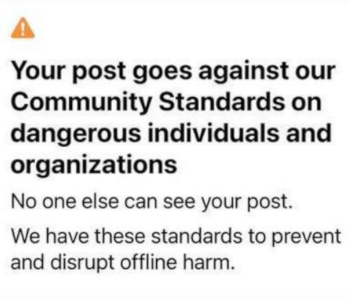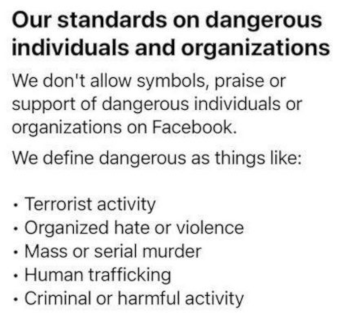By C.J. Hopkins:
So, according to Facebook and the Atlantic Council, I am now a “dangerous individual,” you know, like a “terrorist,” or a “serial murderer,” or “human trafficker,” or some other kind of “criminal.” Or I’ve been praising “dangerous individuals,” or disseminating their symbols, or otherwise attempting to “sow dissension” and cause “offline harm.”
Actually, I’m not really clear what I’m guilty of, but I’m definitely some sort of horrible person you want absolutely nothing to do with, whose columns you do not want to read, whose books you do not want to purchase, and the sharing of whose Facebook posts might get your account immediately suspended. Or, at the very least, you’ll be issued this warning:


Now, hold on, don’t click away just yet. You’re already on whatever website you’re reading this “dangerous,” “terrorist” column on (or you’re reading it in an email, probably on your phone), which means you are already on the official “Readers of Mass-Murdering Content” watch-list. So you might as well take the whole ride at this point.
Related:Rob Slane: One Year To Flatten Life As We Knew It
Slightly off topic, but this AIER article addresses the COVID lockdown as an attempt to control global warming, which is an argument that sometimes surfaces among both supporters and opponents of the lockdowns:
ReplyDeletehttps://www.aier.org/article/no-the-pandemic-didnt-heal-nature/
The article contains some data, and argues that the 6.4% drop in direct carbon emissions in 2020 were more than offset by the carbon-emitting effects of the economic distortions induced by lock-downs.
Of course the main carbon emitting part of the economy was never made up of small stores, restaurants, bowling alleys, and churches. It was the military and corporations like Amazon shipping everything everywhere. As for transportation, the one fight I took last year, in July, was full, and vehicle traffic in by blue city dropped (though not by a lot) in April and May and was greater than ever by late June.
Also once the methane started being released in 2018, what happened with carbon became irrelevant, though the article doesn't discuss that.
Methane?
DeleteHow large is the methane effect versus carbon dioxide? Do you have any numbers or an approximate ratio?
Also, where is the methane coming from. Oil wells, leaky gas pipelines, warming tundra, or methane hydrates on the sea floor?
DeleteIf you do a search on "Artic Methane emissions" or something similar, you will get quite a few articles, and there is a decent Wikipedia page on the subject. As far as I can tell, there has been no mainstream media coverage.
ReplyDeleteMethane is being released from tundra in the Artic and the Artic seabed itself. Its a more powerful greenhouse gas than carbon dioxide, though it dissipates quicker, and some scientists believe its release in the past has contributed to past mass extinctions. Flora and fauna continue to exist in the new climate, but not before all the flora and fauna adjusted to the previous climate die off.